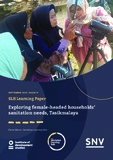| dc.contributor.author | Mercer, Elaine | |
| dc.coverage.spatial | Indonesia | en |
| dc.date.accessioned | 2023-09-15T15:11:00Z | |
| dc.date.available | 2023-09-15T15:11:00Z | |
| dc.date.issued | 2023-09-15 | |
| dc.identifier.citation | Mercer, E. (2023) ‘Exploring Female-headed Households’ Sanitation Needs, Tasikmalaya', SLH Learning Paper 17, The Sanitation Learning Hub, Brighton: IDS, DOI: 10.19088/SLH.2023.015 | en |
| dc.identifier.isbn | 978-1-80470-148-5 | |
| dc.identifier.uri | https://opendocs.ids.ac.uk/opendocs/handle/20.500.12413/18110 | |
| dc.description.abstract | Female-headed households often get left behind in water, sanitation, and hygiene (WASH)
programming and policy. This SLH Learning Paper presents findings and recommendations
for action, from the participatory video research project, ‘Sanitation, health and livelihood
issues for female-headed households in Tasikmalaya’. The project supported eight women
in Awiluar village, Tasikmalaya, (a peri-urban community in west-Java, Indonesia), to explore
the challenges they face and ideas for solution using a participatory video process.
The process included activities to develop personal confidence, teamwork, collective
and visual storytelling, reflective enquiry, communication skills and audio-visual technical
skills. The women collectively created a video to communicate their sanitation, health and
livelihood priorities, which was screened with local government officials and community
members promoting vital dialogue and encouraging action. The aim of the project was to
ensure that the specific needs and long-term interests of female-headed households are
better met going forward.
Further details on the approach can be found in the accompanying SLH Learning Paper,
'Using participatory video for empowerment in sanitation programming'; this describes key
activities involved and their value to programming. It aims to spark sanitation and hygiene
researchers’ interest in the potential for using participatory video. | en |
| dc.description.sponsorship | Sida | en |
| dc.language.iso | en | en |
| dc.publisher | Sanitation Learning Hub | en |
| dc.relation.ispartofseries | SLH Learning Paper;17 | |
| dc.rights | Attribution-NonCommercial 2.0 UK: England & Wales | en |
| dc.rights.uri | http://creativecommons.org/licenses/by-nc/4.0/ | en |
| dc.subject | Education | en |
| dc.subject | Gender | en |
| dc.subject | Health | en |
| dc.subject | Participation | en |
| dc.subject | Poverty | en |
| dc.title | Exploring Female-headed Households’ Sanitation Needs, Tasikmalaya | en |
| dc.type | Series paper (non-IDS) | en |
| dc.rights.holder | Sanitation Learning Hub/IDS | en |
| dc.identifier.externaluri | https://sanitationlearninghub.org/resource/exploring-female-headed-households-sanitation-needs-tasikmalaya/ | en |
| dc.identifier.team | Participation Power and Social Change | en |
| dc.identifier.doi | 10.19088/SLH.2023.015 | |
| dcterms.dateAccepted | 2023-09-15 | |
| rioxxterms.funder | Default funder | en |
| rioxxterms.identifier.project | The Sanitation Learning Hub | en |
| rioxxterms.version | VoR | en |
| rioxxterms.versionofrecord | 10.19088/SLH.2023.015 | en |
| rioxxterms.funder.project | 5e50f69d-6102-4a66-b12d-49ceb02612b0 | en |


